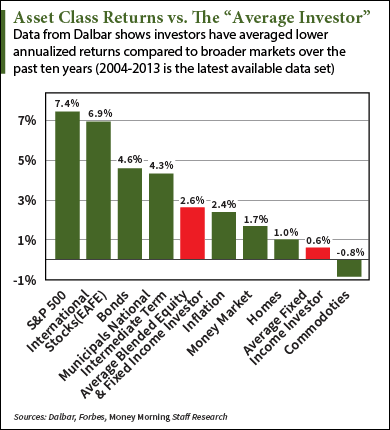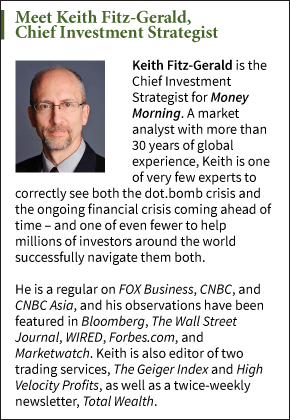Investors can pick stocks based on thorough research, or analyst opinions, or even just a hunch. But all of these styles still leave most investors exposed to the biggest investment mistakes made today...
That's why investors typically perform worse than the broader markets...
You see, the S&P 500 has returned an average of 7.4% since 2004. By comparison, the average investor has only seen a 2.6% net annualized rate of return in the same period, according to the latest data from Dalbar's Quantitative Analysis of Investor Behavior (QAIB).

This 4.8% difference can be chalked up to three traps investors are prone to fall into -- no matter their approach.
"It turns out that every investor is hardwired to do three things that kill returns," said Money Morning Chief Investment Strategist Keith Fitz-Gerald. Fitz-Gerald has helped countless investors over his 30-plus year career and sees the same mistakes over and over.
Exactly what are the biggest investment mistakes that kill returns?
Let's take a look...
Biggest Investment Mistakes No. 1: Short-Term Emotional Investing
The biggest mistake investors make is letting emotions get the best of them. Dalbar's QAIB shows investors make poor investment choices often driven by emotion, and so does history...
In 2008, stocks began to fall at the beginning of the Great Recession. Still, most investors refused to sell at a loss. The market continued to fall, but investors held on. Ultimately, many sold near the bottom, and missed the March 2009 upswing.
The events of 9/11 also provide example.
"Most of the world's major markets bottomed within minutes of each other on short-term panic and emotion," Fitz-Gerald said. "Then, when trading resumed days later, they began to climb almost in sync as highly localized events once again faded into the longer-term fabric of our world."
Fitz-Gerald chalks it up to the way the brain works.
"Human memories tend to focus on recent events more emotionally than they do longer-term plans that are put together with almost clinical detachment," Fitz-Gerald said.
And focusing on short-term market movements distracts from long-term wealth-building plans.
Biggest Investment Mistakes No. 2: Following the Crowd
"Humans would rather be wrong in a group than right individually," Fitz-Gerald said. "So the vast majority of investors tend to make decisions, and mistakes, en masse."
We see this when investors sell low and buy high. Rather than analyzing the situation, they find safety in numbers.
This occurred at the height of the Ebola crisis in fall 2014. More than 10,000 cases of the disease had been reported worldwide through October. Rumors began to fly over which biotech company would be first to come up with a viable vaccine.
When news broke that Tekmira Pharmaceuticals Corp. (Nasdaq: TKMR) was given clearance by the FDA to test a vaccine in Ebola patients, shares soared 40% in three days. But after a $29.93 per share peak on Oct. 3, TKMR stock has fallen 46%. In just two months, investors who bought high saw their initial investment cut in half.
 "We see this in a phenomenon known as 'chasing returns' or 'following the hot money,'" Fitz-Gerald said. "This is why annual performance issues like those published in Forbes, Money Magazine, or Kiplinger's, for example, are so irresistible. And so dangerous."
"We see this in a phenomenon known as 'chasing returns' or 'following the hot money,'" Fitz-Gerald said. "This is why annual performance issues like those published in Forbes, Money Magazine, or Kiplinger's, for example, are so irresistible. And so dangerous."
Following the crowd means failing to stick to your own economic interests -- which is an inadvisable move.
Biggest Investment Mistakes No. 3: Letting Fear Win
Albert Einstein once said, "When the number of factors coming into play in a phenomenological complex is too large, scientific method in most cases fails. One need only think of the weather, in which case the prediction even for a few days ahead is impossible."
His words apply to the stock market just as much as they do to the laboratory.
[epom key="ddec3ef33420ef7c9964a4695c349764" redirect="" sourceid="" imported="false"]
You see, the market has always experienced dips and bumps. And volatility has been particularly heightened the last few months as investors speculate when the Federal Reserve will raise interest rates.
"Right now millions of investors are sitting on the sidelines completely paralyzed by plain old-fashioned fear," Fitz-Gerald said.
Fearful investors park their cash on the sidelines when stock prices go haywire. Or they lack the confidence to pull out of a losing position before the price goes down even more. The fact is, investors who are afraid of getting hurt by the market hurt both financially and emotionally.
"That's why people are more likely to let a losing position go against them than they are to take profits - because they can't take the 'pain' of being wrong," Fitz-Gerald said. "The fact that they are unprofitable becomes almost irrelevant."
Fitz-Gerald notes that "if you understand what these three biggest investing mistakes are, recognize them in yourself, and learn how to eliminate them, you can build wealth much more quickly."
Tweet the author @TaraKateClarke, or leave a comment on Money Morning's Facebook page.
Three of our Top Picks Have Doubled Your Money in 2015: A chipmaker and two biotechs have already seen their stocks break out 100% or more on the year. Here's what they are -- along with a list of all our top performers of 2015...


